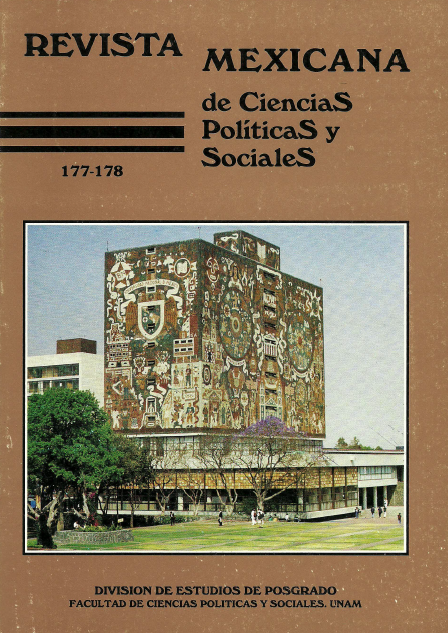La "sociedad mundial” y la carencia de reflexiones normativas en las teorías sociales de NikIas Luhmann y Norbert Elias
Main Article Content
Abstract
Downloads
Article Details
References
Adomo, Theodor W., Negative Dialektik, Frankfurt/M., Suhrkamp, 1988.
Bauman, Zygmunt, Life in Fragments. Essays in Postmodern Morality, Oxford-Cambridge, Blackwell, 1995.
Bauman, Zygmunt, Globalization. The 11 u m an Consequences, Cambridge-Oxford, Polity Press, 1998.
Baumgart, Ralf y Volker Eichener, Norbert Elias zur Einführung, Hamburgo, junio de 1991.
Bogner, Artur, "Elias and the Frankfurt School", en Theory, Culture and Society, vol. 4, 1987, pp. 249-285.
Breuer, Stefan, Die Gesellschaft des Verschwindens, Hamburgo, Rotbuch-Verlag, 1995.
Breuer, Stefan, "Gesellschaft der Individuen, Gesellschaft der Organisationen. Norbert Elias und Max Weber im Vergleich", en Karl Siegbert Rehberg (ed.), Norbert Elias und die Menschenwissenschaften, Frankfurt/M., Suhrkamp, 1996, pp. 303-330.
Brunkhorst, Hauke, "Demokratischer Experimentalismus”, en: Hauke Brunkhorst (ed.), Demokratischer Experimentalismus. Politik in der komplexen Gesellschaft, Frankfurt/M., Suhrkamp, 1998, pp. 7-12.
Devin, Guillaume, "Norbert Elias et l'analyse des relations internationales", en Revue Française de Science Politique, vol. 45, núm. 2, abril de 1995, pp. 305-327.
Elias, Norbert, "Somos los bárbaros tardíos". Norbert Elias sobre el proceso de civilización y el control de los instintos, entrevista en Der Spiegel, 21 de noviembre de 1988.
Elias, Norbert, La sociedad de los individuos, Barcelona, Península, 1990a.
Elias, Norbert, Compromiso y distanciamiento, Barcelona, Península, 1990b.
Elias, Norbert, La sociedad cortesana, México, FCE, 1996.
Elias, Norbert, Über den Prozeß der Zivilisation. Zweiter Band. Wandlungen der Gesellschaft, Entwurf zu einer Theorie der Zivilisation, Frankfurt/M., Suhrkamp, 1997.
Elias, Norbert, Sociología fundamental, Barcelona, Gedisa, 1999.
Emirbayer, Mustafa, "Manifesto for a Relational Sociology”, en American Journal of Sociology (AJS), vol. 103, núm. 2, septiembre de 1997, pp. 281-317.
Habermas, Jürgen, Zur Logik der Sozialwissenschaften, Frankfurt/M., Suhrkamp, 1982.
Heller, Agnes, Una filosofía de la historia en fragmentos, Barcelona, Gedisa, 1999.
Honneth, Axel y Hans Joas, Soziales Handeln und menschliche Natur. Anthropologische Grundlagen der Sozialwissenschaften, Frankfurt/M.-Nueva York, Campus, 1980.
Jay, Martin, La imaginación dialéctica. Una historia de la Escuela de Frankfurt, Madrid, Taurus, 1986.
Joas, Hans, Die Entstehung der Werte, Frankfurt/M., Suhrkamp, 1997.
Luhmann, Niklas, "Die Weltgesellschaft”, en Niklas Luhmann, Soziologische Aufklärung. Aufsätze zur Theorie der Gesellschaft, Opladen, Westdeutscher Verlag, 1975, pp. 51-71.
Luhmann, Niklas, Soziale Systeme. Grundriß einer allgemeinen Theorie, Frankfurt/M., Suhrkamp, 1993a.
Luhmann, Niklas, “Die Moral des Risikos und das Risiko der Moral", en Gotthard Bechmann (ed.), Rkiko und Gesellschaft. Grundlagen und Ergebnisse interdisziplinärer Risikoforschung, Opladen, Westdeutscher Verlag, 1993b, pp. 327-338.
Luhmann, Niklas, Observaciones de la modernidad. Racionalidad y contingencia en la sociedad moderna, Barcelona, Paidós, 1997a.
Luhmann, Niklas, Die Gesellschaft der Gesellschaft, (segundo vol. parcial), Frankfurt/M., Suhrkamp, 1997b.
McCarthy, Thomas, “Constructivismo y reconstructivismo kantianos: Rawls y Habermas en diálogo", en José Antonio Gimbemat (ed.), La filosofía moral y política de Jürgen Habermas, Madrid, Biblioteca Nueva, 1997.
Offe, Claus, “Los nuevos movimientos sociales cuestionan los límites de la política institucional", en Claus Offe, Partidos políticos y nuevos movimientos sociales, Madrid, Ed. Sistema, 1988, pp. 163-244.
Rawls, John, A Theory of Justice, Cambridge, Mass., Harvard University Press, 1971.
Raz, Joseph, “Multiculturalism: A Liberal Perspective", en Dksent, invierno de 1994, pp. 67-79.
Touraine, Alain, Critica de la modernidad, México, FCE. 1994.
Waters, Malcom, Globalization, Londres Routledge, 1995.
Welsch, Wolfgang, Vernunft. Die zeitgenössische Vernunftkritik und das Konzept der transversalen Vernunft, Frankfurt/M., Suhrkamp, 1996.
Willke, Helmut, "Soziologische Aufklärung der Demkratietheorie", en Hauke Brunkhorst (ed. ), Demokratischer Experimentalismus. Politik in der komplexen Gesellschaft, Frankfurt/M., Suhrkamp, 1998, pp. 13-32.

La Revista Mexicana de Ciencias Políticas y Sociales publicada por la Universidad Nacional Autónoma de México se distribuye bajo una Licencia Creative Commons Atribución-NoComercial-SinDerivar 4.0 Internacional.
Basada en una obra en http://www.revistas.unam.mx/index.php/rmcpys/
La RMCPyS autoriza a sus colaboradores que suban una copia de sus trabajos publicados en sus webs personales o en cualquier repositorio de acceso abierto, siempre y cuando se mencione específicamente a la Revista Mexicana de Ciencias Políticas y Sociales como fuente original de procedencia, citando el año y número del ejemplar respectivo y añadiendo el enlace a la página web donde este órgano editorial puede ser consultado in toto, de manera abierta y gratuita en: <www.revistas.unam.mx/index.php/rmcpys>.
Las y los lectores tienen libertad para:
Compartir, copiar y redistribuir el material en cualquier medio o formato.
El licenciante no puede revocar estas libertades en tanto usted siga los términos de la licencia.
De acuerdo con los siguientes términos:
- Atribución: la/el lector/a debe reconocer el crédito de una obra de manera adecuada, proporcionar un enlace a la licencia, e indicar si se han realizado cambios. Puede hacerlo en cualquier forma razonable, pero no de forma tal que sugiera que tiene el apoyo del licenciante o lo recibe por el uso que hace.
- No comercial: la/el lector/a no puede hacer uso del material con fines comerciales.
- Si se mezcla, transforma o se desarrolla a partir de la obra licenciada, no se permite la distribución del material modificado.
Cargos por gestión de artículos
La Revista Mexicana de Ciencias Políticas y Sociales NO cobra tarifas por recibir, procesar o publicar los artículos (Article Processing Charge [APC]) enviados por los autores.

